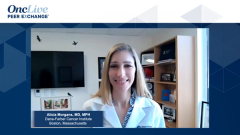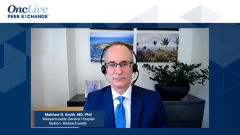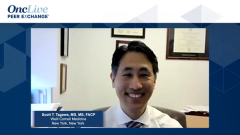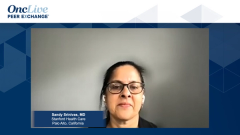
Selecting Optimal Therapy for mHSPC: Design of the ARASENS Trial
Focusing on treatment selection factors in metastatic HSPC, panelists consider how the ARASENS trial redefined treatment approaches.
Episodes in this series

Transcript:
Alicia Morgans, MD, MPH: From your perspective, Evan, as you’re thinking about putting patients on trial or treating them in clinic, what are some clinical factors or disease-related factors you think about as you’re thinking about treatment options for metastatic hormone-sensitive or castration-sensitive disease?
Evan Y. Yu, MD: There are a lot of things I think about, but the ones that I’ll emphasize are the ones that help me make decisions on treatment. The audience probably knows very well that the CHAARTED study was 6 cycles of docetaxel added to androgen deprivation therapy [ADT]. This was 1 of the first treatment-intensification trials, and it was the first 1 to read out and show survival benefit for our patients with new metastatic castration-sensitive prostate cancer. In that study, they used criteria in an old SWOG study that found that volume of disease had some prognostic value. If you had visceral metastases, that put you in a high-volume characteristic grouping. If you had 4 or more bone metastases with at least 1 outside the axial skeleton, which included the vertebral column and the pelvis, that also put you into the high-volume category. If it was node-only disease, that was the low-volume category.
The interesting thing in that trial is that when you broke those subgroupings down, docetaxel benefit was sustained only in the high-volume disease subgroups. So volume of disease is something I pay close attention to in that trial. The LATITUDE trial that led to the approval of abiraterone had separate risk criteria, although most patients fit in the high-risk categories to add abiraterone. More recently, in the ARASENS trial, which was androgen deprivation therapy–docetaxel–darolutamide vs androgen deprivation therapy–docetaxel, allowed patients who were eligible for docetaxel. The interesting finding is that about 86% of the patients had de novo metastases, so synchronous metastases rather than metachronous, having localized therapy earlier and then later developing metastases. That has prognostic implications as well.
Those are all things I take into consideration when I think about how aggressive we should be getting when we see a patient. Of course, we’re always going to take into account the patient’s comorbidities, the patient’s overall ECOG performance status. Do they have certain comorbidities that might make it challenging to give certain agents peripheral neuropathy and docetaxel? We can give many examples, but I’ll stop there.
Alicia Morgans, MD, MPH: Thank you for that. As you said, these are factors that we need to think about, especially as we’re incorporating new data into our treatment algorithms. To that point, Matthew, I’m wondering if you could review the ARASENS trial and walk us through that. That’s the newest information we have for the metastatic hormone-sensitive patient population. Put it into perspective with some of the data that we’ve had over the last few years that have led to combination treatment advances.
Matthew R. Smith, MD, PhD: Sure, I’m happy to do so. First, a couple of things. ARASENS was designed soon after we had the data from CHAARTED and STAMPEDE, showing that the addition of docetaxel to ADT improved survival compared with ADT alone. It’s fitting that the control arm of the study was ADT-docetaxel and others. We competed against the winner of the prior trials, not the loser. That’s different from some of the other trials that you’ll hear about. That was the backbone. Darolutamide was administered concurrently with docetaxel, which is another distinction from some of the other trials, and it was designed to show improvement in overall survival [OS]. That was the prespecified primary analysis with no interim analyses.
We went all in with that trial. It included more than 1300 patients. All patients were enrolled within 12 weeks of starting ADT, randomized to darolutamide or placebo, and then patients in both groups received docetaxel starting within 6 weeks of randomization. As you heard from Evan, the study included a group of patients largely with a poorer prognosis: 86% of patients had de novo metastatic disease. All patients had metastases at study entry, and less than 5% had node-only metastatic disease. There was a clear improvement in overall survival, with a 32.5% reduction in risk of death at the final and only analysis for overall survival, which was highly statistically significant. With that major improvement in OS, there was consistent benefit in all the secondary end points.
The other thing worth mentioning, and this was a point that Scott [Tagawa] brought up about the nonmetastatic CRPC [castration-resistant prostate cancer] trials: this overall survival benefit was seen despite a high rate of subsequent life-prolonging therapy. More than 75% of patients in the placebo group received subsequent life-prolonging therapy by the time of the OS analysis, and two-thirds of patients in the placebo group received a subsequent AR [androgen receptor] pathway inhibitor. This adds to a rich body of data that AR pathway inhibitors improve overall survival in mHSPC [metastatic hormone-sensitive prostate cancer]. The difference with this is that the control group was ADT-docetaxel. Overall survival was the primary end point. Treatment was administered concurrently, so that’s pretty compelling evidence of the benefit in this setting.
Alicia Morgans, MD, MPH: Thank you. I appreciate your comments on the history of when this trial was developed because that certainly puts things into context as we’re trying to understand the landscape.
Transcript edited for clarity.








































